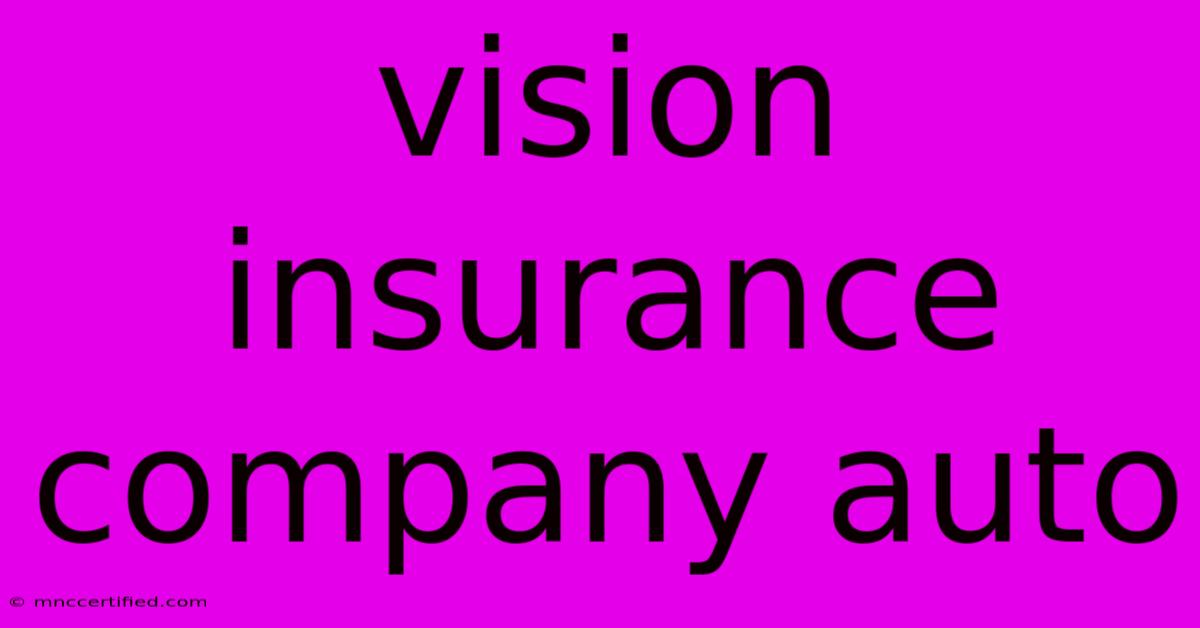Vision Insurance Company Auto

Table of Contents
Vision Insurance Company Auto: Understanding Coverage and Options
Choosing the right vision insurance is crucial for maintaining good eye health, and understanding how it interacts with your auto insurance can save you money and hassle. While not directly related, there are indirect connections and situations where both types of insurance might come into play. This article will explore the relationship between vision insurance and auto insurance, focusing on what your vision plan doesn't cover and where potential overlap might exist.
What Vision Insurance Typically Covers
Before diving into the auto insurance aspect, let's clarify what standard vision insurance usually covers. Most plans include:
- Eye Exams: Annual comprehensive eye exams to detect vision problems and eye diseases.
- Frames and Lenses: Discounts or allowances for purchasing eyeglasses and contact lenses. The specific amount covered varies widely depending on your plan.
- Contact Lens Fittings: If you wear contacts, your plan may cover the initial fitting and subsequent follow-up appointments.
Important Note: Vision insurance typically doesn't cover everything. Procedures like LASIK surgery, extensive eye surgeries, or certain types of eye diseases may require additional coverage or out-of-pocket expenses. Always review your policy's details carefully.
Where Auto Insurance Might Indirectly Relate to Vision
The link between auto insurance and vision insurance is usually indirect, stemming from situations resulting from car accidents:
-
Accident-Related Eye Injuries: If you suffer an eye injury in a car accident, your auto insurance, specifically your medical payments or personal injury protection (PIP) coverage, will likely cover the costs of medical treatment, including ophthalmological care. This includes emergency room visits, surgeries, and follow-up appointments related to the accident. Your vision insurance may also play a role, potentially covering some expenses after your auto insurance coverage has been applied. However, it's crucial to understand that auto insurance is the primary coverage in accident-related injuries.
-
Vision Impairment Claims: In cases of significant vision impairment resulting from an accident, you might have grounds for a claim related to lost wages or other damages. This isn't directly related to your vision or auto insurance policies themselves, but rather involves legal proceedings involving your accident claim.
What Vision Insurance Doesn't Cover Related to Auto Accidents
It's critical to understand the limitations of your vision insurance in accident scenarios:
-
Accident-Related Costs: Vision insurance generally will not cover the costs of treatment resulting directly from a car accident. This responsibility falls under your auto insurance policy.
-
Pre-existing Conditions: If you already had a vision problem before the accident, your vision insurance may not cover treatment related to that condition even if worsened by the accident. Auto insurance, on the other hand, typically covers the aggravation of a pre-existing condition caused by the accident.
-
Replacement of Damaged Glasses: If your glasses are damaged in an accident, your auto insurance, not your vision insurance, would typically be responsible for their replacement.
Filing Claims: A Coordinated Approach
In case of an accident-related eye injury, coordinating claims with both your auto and vision insurance providers is essential. Generally, you should file a claim with your auto insurance first, as this is the primary coverage in such cases. Your auto insurer might then coordinate with your vision insurer to ensure all necessary expenses are covered. Keeping meticulous records of all medical bills, receipts, and communications is crucial for a smooth claims process.
Finding the Right Vision Insurance
When choosing a vision insurance plan, consider your individual needs and budget. Compare plans from different providers, paying close attention to coverage details, annual limits, and network providers. Remember, this information primarily focuses on the relationship between vision insurance and auto insurance in case of accidents. Always consult with both your vision insurance provider and your auto insurance provider for specific questions and details regarding your individual policies.

Thank you for visiting our website wich cover about Vision Insurance Company Auto. We hope the information provided has been useful to you. Feel free to contact us if you have any questions or need further assistance. See you next time and dont miss to bookmark.
Featured Posts
-
Best Walmart Thanksgiving Deals 2024 10 Picks
Nov 29, 2024
-
Martin Frizells Words On Fiona Phillips Health
Nov 29, 2024
-
Oklahoma Dump Truck Insurance
Nov 29, 2024
-
Roma Vs Tottenham Predicted Lineups
Nov 29, 2024
-
Pull Tab Investment Group Hat
Nov 29, 2024